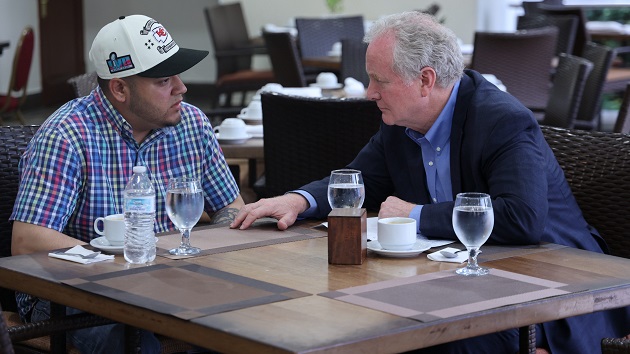
(WASHINGTON) -- The federal judge overseeing the case of wrongly deported Kilmar Abrego Garcia reprimanded the government Friday for not providing enough basis for her to determine whether certain information in the case should be privileged, as Justice Department attorneys have claimed.
At a hearing in Maryland, U.S. District Judge Paula Xinis pressed DOJ lawyers about the Trump administration's recent invocation of the state secrets privilege, which the government has invoked in order to shield information about its handling of the matter.
DOJ attorney Jonathan Guynn pointed to a sealed declaration by Secretary of State Marco Rubio that said that some of the information the plaintiffs are requesting would impact national security interests and foreign affairs.
"We think that Secretary Rubio's declaration is sufficiently detailed to explain what the nature of the material is and why it is state secret -- why its production, why its sharing could reasonably harm the United States foreign affairs," Guynn said.
"Why is it national security as well as foreign relations?" Xinis asked. "What about national security is at issue? There's simply no detail. This is basically, 'Take my word for it.'"
"I can't leave it to the caprice of the executive branch to tell me when privilege is properly invoked. I also have to make sure that there is a substantial and real danger here," said the judge.
Abrego Garcia, a Salvadoran native who had been living with his wife and children in Maryland, was deported in March to El Salvador's CECOT mega-prison -- despite a 2019 court order barring his deportation to that country due to fear of persecution -- after the Trump administration claimed he was a member of the criminal gang MS-13. His wife and attorneys deny that he is an MS-13 member.
Judge Xinis ruled last month that the Trump administration must "facilitate" Abrego Garcia's return to the United States, and the U.S. Supreme Court unanimously affirmed that ruling, "with due regard for the deference owed to the Executive Branch in the conduct of foreign affairs."
Following the government's inaction, Judge Xinis last month ordered several government officials to testify under oath through expedited discovery in order to resolve the matter -- leading the government to assert the state secrets privilege.
Andrew Rossman, an attorney representing Abrego Garcia, told Judge Xinis on Friday that, as part of the discovery process, the government had labeled 1,140 documents privileged and had only turned over 164 of the documents plaintiffs had asked for -- and that 132 of those were court filings and discovery requests that plaintiffs had submitted.
"You're saying what was produced back to you were your interrogatories?" Xinis asked.
"Yes, and court files," Rossman said.
Xinis said at the end of the hearing that she would issue an upcoming ruling on the question of discovery.
The judge also asked DOJ attorneys about a social media post by Department of Homeland Security Secretary Kristi Noem in which she said Abrego Garcia "will never" return to the U.S., calling the statement "problematic." Xinis said the post is contrary to any representation that the government is going to follow her order to facilitate his return, which "the Supreme Court has affirmed."
Guynn responded that the government has provided "more than enough material" for Judge Xinis to conclude that the administration is complying with her court order.
"He has been wrongly removed," Xinis said. "How is it not central to understand what if anything you've done to return him, especially in the face of executive statements from the president [that] we could but we will not return him?"
"He was removed lawfully," Guynn insisted. "He shouldn't be in the United States. He was removed in error. He was sent to El Salvador when there was a notice of withholding for removal."
"No he wasn't," Xinis replied. "I've already made that finding and it has not been challenged by the government. There was no warrant for removal."
Guynn said the government acknowledged that Abrego Garcia was sent to El Salvador due to an "administrative error," but insisted that it was not government "misconduct" and that the removal was lawful, arguing that the government doesn't see the circumstances surrounding Abrego Garcia's deportation "raises to the level of nefarious, extreme government wrongdoing."
"His current basis for being detained in El Salvador pursuant to El Salvador in law -- I don't think that that fact goes to misconduct," Guynn said. "We've already talked about the administrative error, where it was missed that there was a notice of withholding approval from El Salvador, but that is why he was sent to El Salvador, and that's why he's being held now by El Salvador, under a Salvadoran law -- it's because they believe he's a member of the MS-13 gang."
"This is not a case where the government is innocent," Rossman argued. "The case has been about government misconduct. The Supreme Court found Mr. Abrego Garcia's removal was illegal, and then after that ... [the government] continually engaged in bad faith compliance with discovery obligations."
Prior to the hearing, several dozen supporters gathered in front of the Maryland Federal District Courthouse, singing and holding signs in support of Abrego Garcia's right to due process.
"What do we want?" a supporter with a bullhorn called out. "Due process," the crowd responded.
"Yes, it's about one man, but it's also about the Constitution of the United States," Rep. Glenn Ivey, D-Md., told reporters at the courthouse. "Donald Trump needs to be reminded that he is not bigger than the Constitution. The president has to obey the orders of the Supreme Court."
The Trump administration previously invoked the state secrets privilege in a separate case in March when the government refused to provide a federal judge with information about deportation flights to El Salvador under the Alien Enemies Act.
Copyright © 2025, ABC Audio. All rights reserved.

